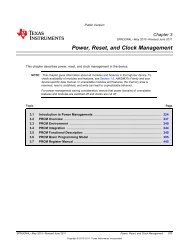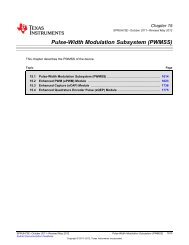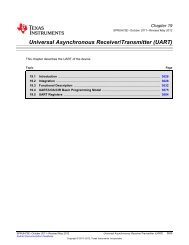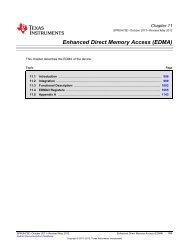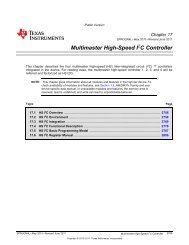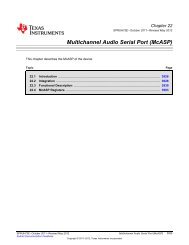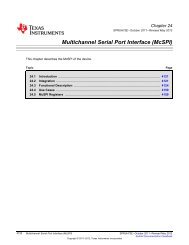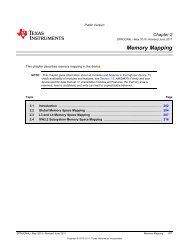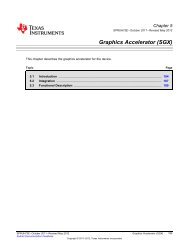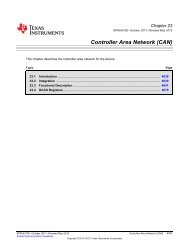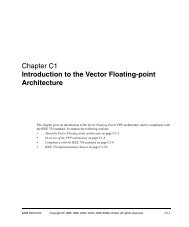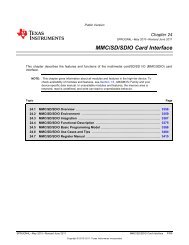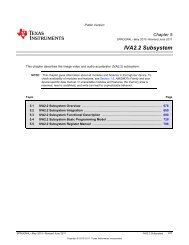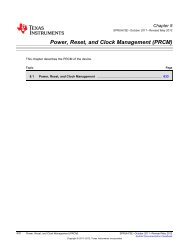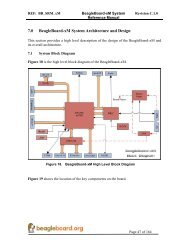Chapter 10 Memory Subsystem.pdf
Chapter 10 Memory Subsystem.pdf
Chapter 10 Memory Subsystem.pdf
Create successful ePaper yourself
Turn your PDF publications into a flip-book with our unique Google optimized e-Paper software.
C0 - C1 - C2<br />
Class 1 granted<br />
Class 2 granted<br />
Public Version<br />
SDRAM Controller (SDRC) <strong>Subsystem</strong> www.ti.com<br />
<strong>10</strong>.2.6.2.2.2 Priority Between Groups<br />
The SMS.SMS_CLASS_ARBITERi[7:6] HIGHPRIOVECTOR field defines the priority between groups in a<br />
class.<br />
<strong>10</strong>.2.6.2.2.3 Priority Between Classes<br />
Class 0 always has the highest priority. Then, a weight is programmed within the arbitration of Class 1 and<br />
Class 2:<br />
• The SMS.SMS_INTERCLASS_ARBITER[23:16] CLASS1PRIO field specifies the number (M) of<br />
transactions dedicated to Class 1.<br />
• The SMS.SMS_INTERCLASS_ARBITER[7:0] CLASS2PRIO field specifies the number (N) of<br />
transactions dedicated to Class 2.<br />
M and N parameters are used to set a PWM arbitration. For instance, two schemes appear: at time t,<br />
Class 1 is serviced for M cycles, and is directly followed by service to Class 2 for N cycles. If Class 2 is<br />
serviced first for N cycles, then Class 1 is granted for M cycles. Arbitration is given more importance;<br />
Class 1/2 is favored over Class 2/1. As shown in Figure <strong>10</strong>-69, two arbitration schemes can appear:<br />
• Class 0 is serviced first, followed by Class 1, and then Class 2 (C0 - C1 - C2).<br />
• Class 0 is serviced first, followed by Class 2, and then Class 1 (C0 - C2 - C1).<br />
<strong>10</strong>.2.6.2.3 Arbitration Granularity<br />
Figure <strong>10</strong>-69. Priority Between Classes<br />
Class 0 granted<br />
(highest priority)<br />
PWM arbitration<br />
Class 2 granted<br />
Class 1 granted<br />
SMS_INTERCLASS_ARBITER[7:0] CLASS1PRIO field:<br />
defines the number M of transactions dedicated to class 1.<br />
SMS_INTERCLASS_ARBITER[23:16] CLASS2PRIO field:<br />
defines the number N of transactions dedicated to class 2.<br />
Arbitration is the mechanism that give more or less importance to incoming requests depending on the<br />
initiator origin. Granularity influences the boundary of a transaction because it imposes the following<br />
questions:<br />
• How many requests to service?<br />
• How long to track the current transaction?<br />
• When to make the next arbitration decision, or when does the next transaction boundary occur?<br />
<strong>10</strong>.2.6.2.3.1 Idle Cycle<br />
The idle gives more granularity to the arbitration; it lets the arbiter wait one idle cycle before moving the<br />
arbitration grant to another thread.<br />
Within a burst (see Figure <strong>10</strong>-70 for an example):<br />
2270 <strong>Memory</strong> <strong>Subsystem</strong> SPRUGN4L–May 20<strong>10</strong>–Revised June 2011<br />
Copyright © 20<strong>10</strong>–2011, Texas Instruments Incorporated<br />
C0 - C2 - C1<br />
sdrc-026



